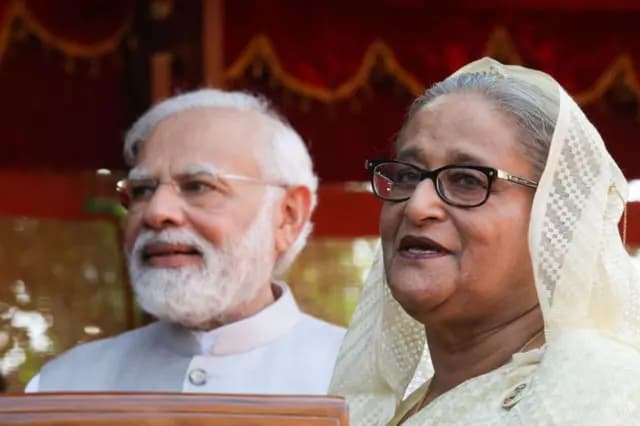We're loading the full news article for you. This includes the article content, images, author information, and related articles.
A death sentence for former Prime Minister Sheikh Hasina has triggered a high-stakes diplomatic standoff between Bangladesh and India, with New Delhi’s decision on her extradition poised to redefine regional power dynamics and its strategic rivalry with China.

A special tribunal in Dhaka on Monday, 17 November 2025, sentenced former Bangladesh Prime Minister Sheikh Hasina to death in absentia for crimes against humanity, a verdict that has plunged relations between Bangladesh and its powerful neighbour, India, into a severe crisis. Ms. Hasina, who took refuge in India after being ousted from power in August 2024, was found guilty for her role in the violent state crackdown on student-led protests that resulted in hundreds of deaths.
The interim government in Bangladesh, led by Nobel laureate Dr. Muhammad Yunus, immediately hailed the verdict and formally demanded Ms. Hasina's extradition to face justice, citing a bilateral treaty. However, New Delhi has remained non-committal, creating a diplomatic impasse that tests its long-standing alliance with Ms. Hasina against its need to build a working relationship with the new administration in Dhaka.
The charges stem from the July-August 2024 mass uprising, which began as a student protest against a civil service job quota system and escalated into a nationwide pro-democracy movement. The Hasina government's response was severe, with security forces accused of using lethal force, including live ammunition, against civilians. A United Nations report in February 2025 estimated that up to 1,400 people may have been killed during the unrest.
The International Crimes Tribunal in Dhaka, in a live broadcast, found Ms. Hasina and her former Home Minister, Asaduzzaman Khan, guilty of ordering the crackdown. In a statement, Ms. Hasina condemned the verdict as “biased and politically motivated,” calling the tribunal a “kangaroo court.” The UN Human Rights Office described the verdict as an “important moment for victims” but reiterated its opposition to the death penalty.
Following weeks of escalating protests, Ms. Hasina resigned and fled to India on 5 August 2024. Three days later, on 8 August 2024, Dr. Muhammad Yunus was sworn in as the Chief Adviser of an interim government, tasked with steering the country towards fresh elections scheduled for February 2026.
For 15 years, Sheikh Hasina was one of India's most crucial strategic allies, ensuring stability on its eastern flank, enhancing connectivity, and crucially, aligning Bangladesh's interests with New Delhi's over Beijing's. Her ousting and subsequent conviction place India in an extremely difficult position.
The 2013 extradition treaty between the two nations contains clauses that allow a request to be refused if the offence is of a “political character.” Indian officials and analysts suggest this provides legal grounds to deny the extradition, arguing the trial was politically motivated. In a cautious statement, India's Ministry of External Affairs said it had “noted the verdict” and remains committed to Bangladesh's stability and democracy, without directly addressing the extradition demand.
According to Michael Kugelman, Director of the South Asia Institute at the Wilson Center, India faces a major bind. Continuing to shelter Ms. Hasina risks alienating the new government in Dhaka, potentially pushing it closer to China. Handing her over, however, would be seen as a betrayal of a steadfast ally. “Bangladesh cannot afford to lose India,” Mr. Kugelman stated in a separate analysis in August 2024, emphasizing the need for a “workable relationship” for trade, security, and geopolitics.
While the crisis is unfolding thousands of kilometres away, its implications resonate with nations like Kenya. The standoff highlights the precarious nature of international relations, where strategic interests, legal obligations, and human rights accountability often collide. For East Africa, which navigates its own complex geopolitical landscape with competing global powers, the India-Bangladesh situation serves as a case study in the potential for rapid political transitions to destabilize long-held regional alliances.
Kenya and Bangladesh have been working to expand bilateral trade in sectors like textiles, pharmaceuticals, and agriculture. Both are members of the Commonwealth and the Indian-Ocean Rim Association. The political instability and the diplomatic fallout could impact these emerging economic partnerships. More broadly, the events in Bangladesh underscore a growing global theme: the demand for accountability from former leaders for alleged human rights abuses, a principle with significant relevance across the African continent.
New Delhi's ultimate decision on Sheikh Hasina will not only determine the future of its relationship with a key neighbour but also send a powerful message about its role as a regional power and its commitment to international justice versus strategic patronage. With elections looming in Bangladesh, the standoff is set to intensify, leaving the region's geopolitical future hanging in the balance.
Keep the conversation in one place—threads here stay linked to the story and in the forums.
Sign in to start a discussion
Start a conversation about this story and keep it linked here.
Other hot threads
E-sports and Gaming Community in Kenya
Active 9 months ago
The Role of Technology in Modern Agriculture (AgriTech)
Active 9 months ago
Popular Recreational Activities Across Counties
Active 9 months ago
Investing in Youth Sports Development Programs
Active 9 months ago